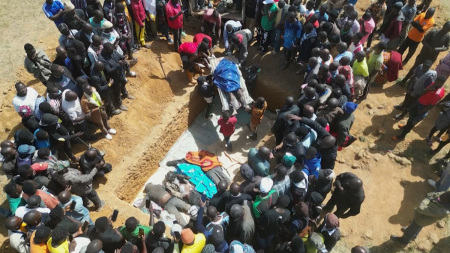Over 16,000 Christians killed in 4 years as violence in Nigeria continues unabated: observatory

More than 16,000 Christians were killed in Nigeria in four years between 2019 and 2023 as more followers of Christ were victims of violence than adherents of other religions, according to data collected by the Observatory for Religious Freedom in Africa.
ORFA released a four-year data project Thursday documenting 55,910 fatalities from 9,970 attacks, including both civilians and combatants, across Nigeria. Of those killed, 30,880 were civilians. Christian victims totaled 16,769, significantly outnumbering the 6,235 Muslim fatalities — the ratio of Christian to Muslim deaths being 6.5:1. Radicalized Muslim Fulani herdsmen were responsible for 55% of the Christian deaths.
"For over a decade atrocities against civilians in Nigeria have been downplayed or minimized. This has proved a major obstacle for those seeking to understand the violence," the researchers wrote in the 136-page report shared with The Christian Post.
"Misleading euphemisms, such as 'armed herdsmen' and 'cattle grazers' are used to describe continual waves of invasion, torture and killing in rural communities. Descriptions of attacks as 'ethnic clashes,' 'farmers-herders clashes' or retaliatory attacks are seriously misleading."
Another frequent term used to describe militias that carry out mass kidnappings and enforce "serfdom" on communities is "bandits," the report warns, adding that "a policy of concealing the religious identity of victims" is distorting the reality of the situation.
"Fulani Ethnic Militia are targeting Christian populations, while Muslims also suffer severely at their hands," notes Rev. Gideon Para-Mallam, an observatory partner and analyst, said in a statement.
"Millions of people are left undefended," Frans Vierhout, senior analyst at the Observatory of Religious Freedom in Africa, added. "For years, we've heard of calls for help being ignored, as terrorists attack vulnerable communities. Now the data tells its own story."
Across Nigeria, over 21,621 people were abducted in 2,705 attacks, with some incidents overlapping. The observatory recorded 11,610 distinct attacks where individuals were killed or abducted. Of these, 8,905 involved only killings, 1,065 included both killings and abductions and 1,640 involved only abductions.
Of the 21,532 civilians abducted, 11,185 were Christians, and 7,899 were Muslims, according to ORFA.
Researchers stated the religious identity of victims significantly influenced their treatment by captors, with Christian captives often facing harsher conditions and higher risks of execution compared to their Muslim counterparts.
On average, eight attacks involving killings or abductions occurred daily over a four-year period in Nigeria. Fear of violence has gotten so bad there were reports of children sleeping in trees to avoid nighttime attacks.
The data showed a large geographic spread of violence, with 65 different Local Government Areas affected. The majority of civilian fatalities occurred during attacks on communities, particularly during the farming season's peak months between April and June. The North West, North Central and North East regions were identified as epicenters of such attacks.
People were most vulnerable in their homes, with the majority of civilians — 25,312 killed and 16,761 abducted — suffering attacks in their communities, according to the report. This contrasts with other locations where 5,568 civilians were killed and 4,771 abducted.
The report pointed to the Fulani Ethnic Militia and other less-known groups as primary aggressors.
Armed Fulani herdsmen, part of FEM, and various terrorist groups were responsible for most killings and abductions, overshadowing the more internationally recognized threats from Boko Haram and Islamic State West Africa Province. For instance, armed Fulani herdsmen were responsible for the deaths of 11,948 civilians, while other terror groups were responsible for 12,039 deaths. Armed Fulani were responsible for over 6,000 civilian abductions, while other groups were responsible for 13,000.
Armed Fulani were responsible for 9,153 Christian deaths during that timespan; Other terrorist groups accounted for 29% or 4,895 deaths. Combined, Boko Haram and ISWAP were responsible for 8% of the Christian deaths, which amounts to 1,268 fatalities.
The report criticized the Nigerian government's focus away from these areas, suggesting that the lack of adequate security response has allowed these groups to operate with near impunity.
"The Nigerian government should wake up to its responsibility of securing the lives and properties of Nigerians. Impunity has allowed targeted attacks against innocent people to continue unabatedly," the report concludes. "The government has [a] responsibility to maintain law and order, therefore, providing protection for lives and properties will reassure citizens and endear trust in the government. If the people cannot trust the government to deliver justice, more militant groups and sub state actors could rise up to the State against its citizens."
The observatory urges the Nigerian government to prioritize peace and coexistence, reevaluate its security strategies and enhance support for affected communities.
Key suggestions include reorienting national values towards justice and reconciliation, enhancing security measures to protect civilians and promoting interfaith dialogue to mitigate religious biases and tensions.
The report called for a concerted effort also from international bodies to address the violence in Nigeria.
The European Union member states, along with the United States and United Kingdom governments, should allocate more aid resources to Nigeria's North Central Zone and Southern Kaduna, which are experiencing a displacement crisis, the report said, explaining that in areas where internally displaced persons can return to their home communities, they often find their houses and communities in ruins.
ORFA added that the U.S. and U.K. governments should use their positions on the United Nations Security Council to pursue a resolution aimed at enhancing the security of communities in Nigeria that are vulnerable to attacks.
The U.S. government continues to face pressure from advocates and the U.S. Commission on International Religious Freedom to again label Nigeria as a country of particular concern for international religious freedom after it was removed from the list during the first year of the Biden administration.






















